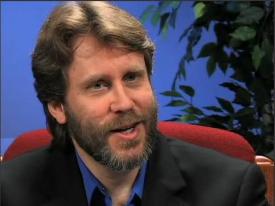Though we understand the importance of time alone with God, sometimes ministry activity crowds it out. Wayne Stiles, in an article posted on the SonLife Live 2/6 Network (9/9/13), writes about the “one thing” that Jesus did to keep his priorities straight, turning “activity into efficiency.”
 I’ve noticed an unsettling habit in my life. Whenever I find myself with a free moment, I feel compelled to fill it with something productive. Because I hate to waste time, I fill it with activity and justify it as productivity. But I’m learning that constant movement doesn’t represent efficiency. It could, moreover, represent just the opposite.
I’ve noticed an unsettling habit in my life. Whenever I find myself with a free moment, I feel compelled to fill it with something productive. Because I hate to waste time, I fill it with activity and justify it as productivity. But I’m learning that constant movement doesn’t represent efficiency. It could, moreover, represent just the opposite.
As with every other part of the human experience, Jesus remains our model of efficiency. But His life—even before the cross—was no easy walk:
- The demands on Him were constant.
- The needs He faced were overwhelming.
- The expectations He encountered were unrealistic.
No person was ever more qualified to do it all, and yet Jesus took life in the fast lane in stride. What was His secret?
Jesus’ Secret to Efficiency
At the end of a busy day of ministry, Jesus’ work followed Him home: “And when evening had come, after the sun had set, they began bringing to Him all who were ill . . . And He healed many who were ill with various diseases” (Mark 1:32-34).
Ready for a shock? Notice they brought “all” who were ill, but Jesus only healed “many.” The One who could have done it all, chose not to. Here’s why: “In the early morning, while it was still dark, He arose and went out and departed to a lonely place, and was praying there. And Simon and his companions hunted for Him; and they found Him, and said to Him, ‘Everyone is looking for You.’ And He said to them, ‘Let us go somewhere else to the towns nearby, in order that I may preach there also; for that is what I came out for’” (Mark 1:35-38).
Jesus, more than any other person, could have met the physical needs of all the people that day, but He chose not to. Why? Because Jesus’ priority was to preach, not to heal. Therefore He could say no—without guilt—to legitimate needs in order to focus His time.
The “One Thing”
When we try to do too much we buy into the lie that says the more we do the more productive we are (and the more significant we are). But the more we do, the poorer job we do. Hardly efficiency! Better to do one thing well than to do many things poorly. At the Judgment Seat of Christ, Jesus will evaluate us based the quality of our work—and our motives—not on the quantity (1 Corinthians 3:13). One thing. Jesus wasn’t the only one who practiced this wise principle:
- David prayed: “One thing I ask of the Lord, this is what I seek . . .” (Psalm 27:4).
- Paul wrote: “This one thing I do . . .” (Philippians 3:13).
This “one thing” was the same for David as it was for Paul—and as it was for Jesus. Giving priority to one’s relationship with the Father helps bring all other priorities in line. There’s no other way you’ll know what to let go and what to keep. “The secret of concentration is elimination,” wrote Dr. Howard Hendricks.
The One Thing that Changes Your Activity to Efficiency
Don’t fall for the lie that a “good Christian” never says no to legitimate needs. Even Jesus said no. Saying no doesn’t mean you have no compassion. No one had more compassion than Jesus. But prioritizing simply means you’re focusing where God would have you focus—just like Christ did.
Jesus made it a priority—as should we—to devote time alone with the Father. Why? It helps you refocus and regain perspective on your life. Time with God helps you say no to good things by revealing God’s will for your life.
Refusing to do the many good things you can do allows you to do the one thing you must do.
Rather than cram every available moment with activity and call it efficiency, let’s remember what Jesus did. Since He could have done it all, but chose not to, how much more so should we who can’t do it all, choose not to?




